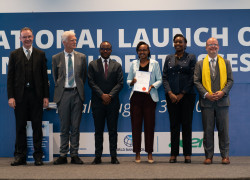Deloitte unveils the findings of its Luxembourg CFO survey
Due to the challenging economic environment, cash management and working capital requirements, as well as the question of financing and relationships with financial partners currently figure among Luxembourg CFOs’ (Chief Financial Officer) major concerns.
Thanks to this second edition of the survey, we have managed to establish a full breakdown of the tasks and challenges currently faced by financial directors in Luxembourg. An analysis of the responses obtained has enabled us not only to confirm our observations but also to put certain preconceived ideas right
Georges Kioes, partner in Deloitte Luxembourg's audit department and CFO Services Leader
These results were unveiled in the second Deloitte Luxembourg survey,focusing on the new challenges faced by Luxembourg CFOs in the day-to-day management of their businesses.
The 2012 survey, conducted in partnership with the Confédération Luxembourgeoise du Commerce (CLC) and the Fedil - Business Federation Luxembourg, allowed Deloitte to gather over 80 responses from a range of commercial and industrial firms located in Luxembourg with a minimum of 50 employees.
"Thanks to this second edition of the survey, we have managed to establish a full breakdown of the tasks and challenges currently faced by financial directors in Luxembourg. An analysis of the responses obtained has enabled us not only to confirm our observations but also to put certain preconceived ideas right",explains Georges Kioes, partner in Deloitte Luxembourg's audit department and CFO Services Leader.
"This survey further shows a large number of areas for improvement and may, in this respect, be considered a valuable tool both for Luxembourg CFOs and for companies wishing to set up in Luxembourg", adds Petra Hazenberg, partner in Deloitte Luxembourg's advisory and consulting department, also responsible for CFO Services.
The main findings of the survey are as follows:
- Management of Working Capital Requirements (WCR) under control
While 80% of CFOs stated that their companies managed working capital requirements and cash flows adequately, it is interesting to note that when asked about their difficulties, 1 out of every 5 CFOs cited the limits of the tools used and said that WCR roles and responsibilities could be more clearly defined.
It is therefore critical that CFOs implement effective processes and tools to monitor key indicators, particularly relating to working capital requirements.
In addition, the vast majority of CFOs confirmed that they carefully monitored late payments by clients (96%) and days outstanding (93%). They also regularly reviewed the ‘order to cash’ cycle (84%), which enabled them to keep average days outstanding to below 40 days in the case of 87% of CFOs.
By this means, 73% of CFOs managed to minimise the percentage of turnover lost due to bad debt (less than 1%).
- Cash flow forecasting – a key area requiring development
The survey underlined the need to develop firms' capability to forecast future cash flows.
In fact, when surveying CFOs regarding the variations observed between actual and forecast levels of cash, 2 out of 5 CFOs stated that they encountered unplanned cash needs.
The main factors explaining the variations between actual and forecast levels were connected with inefficient processes rather than inappropriate tools, which may prove to be a problem in an uncertain, difficult economic environment.
This is a fundamental issue because a cash flow forecasting process is needed to optimise the level of cash available in order to manage financing requirements in the best way possible.
- Finance management is a clear and efficient process according to CFOs
When CFOs were asked about their finance management, the various financial instruments used and their processes for reviewing and optimising their company's financial structure, over 78% stated that they had clear and efficient financing processes.
However, 1 in 5 CFOs does not review or optimise their company's debt on a regular basis nor explore the possibilities for public-sector aid and subsidies and admitted that their debt structure may not be optimised from a tax, financial or risk standpoint.
The survey also shows that net financial debt represented less than 50% of total assets for 93% of organisations and that the average maturity of financial debts was less than three years for 52% of the companies surveyed.
In the event of recourse to debt still being needed on maturity, this implies that 50% of organisations may be obliged to renegotiate their short-term debt in an environment in which financial conditions may still prove to be harsh.
Furthermore, since the beginning of the financial crisis, 27% of the companies surveyed have seen a reduction in the average maturity of new loans, which demonstrates greater difficulty in obtaining long-term financing, leading to more frequent renegotiations. This change should be observed in parallel with the deterioration of the financial structure seen in the case of 24% of CFOs surveyed, while 15% of them considered that their financial structure has been under pressure since the start of the crisis.
- A fairly limited number of financial instruments used
CFOs mainly responded that they used equity capital to finance current operations, WCR and corporate investment. Equity capital is the main financing tool for over 60% of CFOs. Then, to a lesser extent and depending on the type of requirement, CFOs also cite bank loans and credit lines.
This is not really surprising, considering the moderate level of indebtedness of the firms surveyed, as previously stated.
Lastly, 3 out of 4 CFOs indicated that the total cost was the maincriterion for selection; for 1 in 10 CFOs, it was the relationshipwith the lender/investor, whereas for 1 out of 2 CFOs said banking covenants were critical.
- CFOs and their banks:a stable relationship
The final section of the survey focuses on relationships between CFOs and their banks. It studies the current state of relationships between CFOs and their lenders and assesses the impact of the current economic situation on this.
It is interesting to learn that CFOs maintain business relationships on behalf of their company with an average of six financial institutions but obtain financing for their company from only three of these institutions.
Moreover, and although most CFOs expressed their desire to maintain the same number of sources of financing, a significant number of them (20%) intend to diversify and to develop new banking relationships.
However, stricter conditions do not seem to have affected relationships between CFOs and their lenders, as 83% of CFOs surveyed considered them unchanged and even improved.
Lastly, when CFOs were asked about the impact of the Basel III framework on their relationships with their banks, 1 in 3 reported a negative impact.
This seems to indicate a certain need for banks to better communicate on the subject of the regulation and its impacts on the funding they offer their clients.
- External factors weigh down oncash management and the financing of operations
The main problems mentioned by CFOs were late client payments (in 62% of cases) and the higher level of collateral required in exchange for finance (in 46% of cases). As mentioned earlier, this most likely explains why CFOs closely monitor late payments.
It is surprising that despite the financial and economic crisis, the vast majority of CFOs (75%) stated that banks were still highly willing to finance their business. This is also likely to contribute to maintaining good relationships between CFOs and their banks.
Although the CFOs surveyed stated that their financing needs are limited, 1 in 4 admitted that since the start of the financial crisisat least one of their projects had been abandoned or postponed due to lack of funding CFO sentiment regarding future financing conditions highlighted the fact that CFOs were rather pessimistic in this regard and did not expect any noticeable improvement in the near future.
The full version of the Luxembourg CFO survey is available on Deloitte Luxembourg's website at the following address: www.deloitte.com/lu/survey/cfo/2012
Communiqués liés
RSA launches technology and management liability insurance s...
RSA Luxembourg, part of Intact Insurance Specialty Solutions, today announces th...
Lancement d'une nouvelle connexion intermodale entre Bettemb...
CFL multimodal a le plaisir d'annoncer le lancement de sa nouvelle connexion i...
Experts from LUNEX award first micro-credentials in Rwanda o...
The Rwanda Ministry of Education (MINEDUC) formally inaugurated Syllabi, a publi...
ERG Notes that ENRC Secures Landmark Victory as Court of App...
Eurasian Resources Group (ERG), a leading diversified natural resources group he...
LetzToken et La Vie est Belle annoncent leur partenariat ouv...
«?LetzToken?», plateforme de tokenisation pionnière basée à Luxembourg, et ...
ERG announces a Pre-Export Finance Facility Agreement based ...
Eurasian Resources Group (“ERG”, “The Group”), a leading diversified nat...
Il n'y a aucun résultat pour votre recherche







